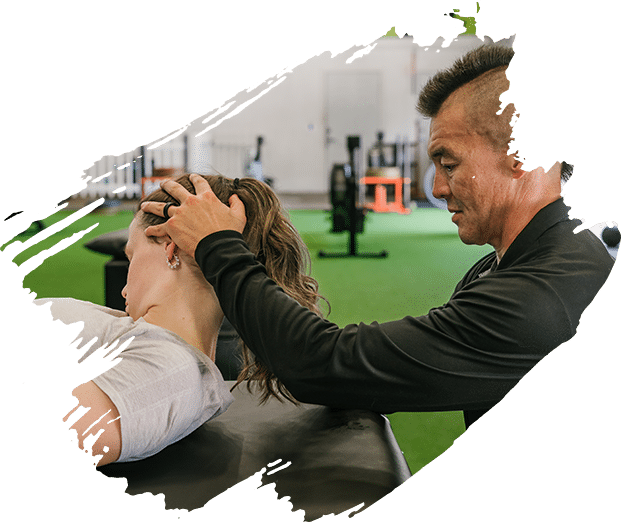Resolutions That Actually Work
 Everybody has made resolutions that lasted only a week or two. It's true that most New Year's resolutions have a short shelf life, with the average one kept until February 1, just 32 days after it was established. In fact, 68% of Americans said they quit their resolutions even sooner than that. So how do you make a resolution and stick with it? What are resolutions that really work? Sure, we're past New Year's Day, but that doesn't mean you can't start fresh and make a resolution to make your life better right now.
Everybody has made resolutions that lasted only a week or two. It's true that most New Year's resolutions have a short shelf life, with the average one kept until February 1, just 32 days after it was established. In fact, 68% of Americans said they quit their resolutions even sooner than that. So how do you make a resolution and stick with it? What are resolutions that really work? Sure, we're past New Year's Day, but that doesn't mean you can't start fresh and make a resolution to make your life better right now.
Start with something small and build on it.
Resolutions are about eliminating bad habits and starting beneficial ones. You notice the word habit. That's important. You didn't just wake up one morning and notice you gained a large amount of weight overnight or had all your muscle turn to flab. It took time and several bad habits for that to happen. Make one small change, either in your activity level and diet. Focus on it until it becomes a habit, which may take a couple of months. Make it as simple as substituting water for soft drinks or coffee---or at least to start with---for all the coffee and soft drinks but one during each day.
Look for ways to walk more and increase your activity level.
A sedentary lifestyle doesn't change overnight without you focusing on changing it. Set a goal to take a walk every day. Try to get in 30 minutes, whether it's a 30-minute walk or three 10-minute ones. You may already have a habit established every evening that involves watching videos, television or gaming. Find a way to make it more active. For instance, before you settle in, do a plank and hold for as long as possible. During commercials on television, do jumping jacks. Get the whole family to do them with you for added fun. Seriously, everyone will whine and complain, but keep at them and you're sure to swing them over to your side. It could be a new family tradition that benefits everyone.
Learn to change how quickly you do things.
Are you a procrastinator until it comes to eating sugary treats? Use that talent to your benefit. Push yourself to do ten jumping jacks immediately, but start to procrastinate when it comes to sugary treats. If you mess up and eat something sugary, forgive yourself and start again. It doesn't help you in any way to chronically condemn yourself. In fact, that's a bad habit that you also should resolve to change. If you don't like yourself, why would you want to do anything that makes you healthier?
- If cutting out added sugar is one of your goals, start first by cutting out sweet treats, such as candy or baked goods, then focus on food with added sugar once it becomes a habit. It's easier if you have fresh fruits and vegetables ready as a snack.
- Carry water with you at all times if you're making dietary changes. When you feel like eating or drinking something sweet, take a large gulp of water or two to quell your appetite.
- Create a go-to list that starts with your initial goal and builds to the ultimate goal. Once you're sure you've conquered one habit, move on to the next goal on the list. When you have a plan of action, it makes change easier.
- If you want an option that's even easier, come into Habitat Health and Fitness for a free trial session. We'll create the program for you, then all you have to resolve to do is show up and do it.
For more information, contact us today at Habitat Health & Fitness



 What's the cost of obesity? Just check the hospitals in Lakeland, Florida. Many of the patients are there either because of obesity or the diseases contributed to by obesity. In fact, the epidemic of obesity has led to increased spending for health issues. It costs more to purchase personal goods if you're obese. Annually, an obese woman pays $4,879 more and a man pays $2,646 more.
What's the cost of obesity? Just check the hospitals in Lakeland, Florida. Many of the patients are there either because of obesity or the diseases contributed to by obesity. In fact, the epidemic of obesity has led to increased spending for health issues. It costs more to purchase personal goods if you're obese. Annually, an obese woman pays $4,879 more and a man pays $2,646 more.
 While there's a general consensus that after six weeks, exercising can resume. However, just like a workout program, that should be modified for your particular situation. If you've had a normal delivery and have no complications, maybe even exercised throughout the pregnancy, you might start sooner. If you had a C-section or other complications, you may not be ready. Always check with your health care professional for the best time to begin doing strength training after having a baby.
While there's a general consensus that after six weeks, exercising can resume. However, just like a workout program, that should be modified for your particular situation. If you've had a normal delivery and have no complications, maybe even exercised throughout the pregnancy, you might start sooner. If you had a C-section or other complications, you may not be ready. Always check with your health care professional for the best time to begin doing strength training after having a baby.
 There are some very good reasons to get a personalized program and one of those is ensuring special needs are met. For instance, can you still exercise with bad feet or ankles? The answer is yes, but you need a program designed specifically for your needs. At Habitat Health and Fitness in Lakeland, Florida, FL, our personal trainers ask about those special needs, learn about your goals and assess your fitness before creating a program for you. So what type of exercises are safe to do if you have problems. It depends on the exact problem, but here are some generalized ideas.
There are some very good reasons to get a personalized program and one of those is ensuring special needs are met. For instance, can you still exercise with bad feet or ankles? The answer is yes, but you need a program designed specifically for your needs. At Habitat Health and Fitness in Lakeland, Florida, FL, our personal trainers ask about those special needs, learn about your goals and assess your fitness before creating a program for you. So what type of exercises are safe to do if you have problems. It depends on the exact problem, but here are some generalized ideas.
 If you haven't already set a fitness goal. It's time to start. Setting a goal is like having a destination on a road trip. If you don't know where you're going, you won't know when you get there and you definitely won't know the quickest way to go. A fitness goal can be anything that's important to you. If you want to look better, it can be toning your body or losing weight. If your health is top priority, it may include building your strength, flexibility and endurance.
If you haven't already set a fitness goal. It's time to start. Setting a goal is like having a destination on a road trip. If you don't know where you're going, you won't know when you get there and you definitely won't know the quickest way to go. A fitness goal can be anything that's important to you. If you want to look better, it can be toning your body or losing weight. If your health is top priority, it may include building your strength, flexibility and endurance.
 My clients at Habitat Health and Fitness in Lakeland, Florida, aren't the only people that want to get rid of belly fat. It's almost universal. It takes the right type of workout, but also one more thing, a healthy diet. No matter how many workouts you do that target the belly, if there's a layer of fat covering it, nobody will know. You have to lose weight all over your body to see the results.
My clients at Habitat Health and Fitness in Lakeland, Florida, aren't the only people that want to get rid of belly fat. It's almost universal. It takes the right type of workout, but also one more thing, a healthy diet. No matter how many workouts you do that target the belly, if there's a layer of fat covering it, nobody will know. You have to lose weight all over your body to see the results.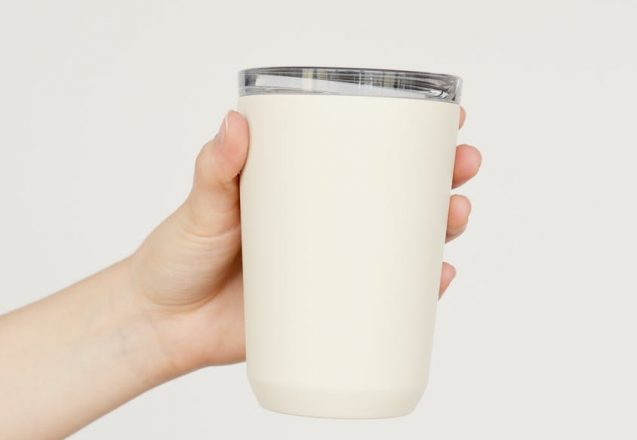
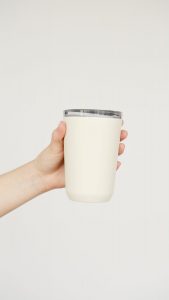 We focus a lot on eating a healthy pre and post workout snack that contains protein and carbs. One of those options is yogurt and fruit and another is cheese and crackers. Many of the protein options come from dairy products, but is dairy in your diet really a healthy option or not. If you're lactose intolerant, milk products probably aren't the best thing to eat, even though most report that small amounts of cheese, cottage cheese or yogurt doesn't affect them. What about the rest of the people who aren't allergic or intolerant of dairy?
We focus a lot on eating a healthy pre and post workout snack that contains protein and carbs. One of those options is yogurt and fruit and another is cheese and crackers. Many of the protein options come from dairy products, but is dairy in your diet really a healthy option or not. If you're lactose intolerant, milk products probably aren't the best thing to eat, even though most report that small amounts of cheese, cottage cheese or yogurt doesn't affect them. What about the rest of the people who aren't allergic or intolerant of dairy?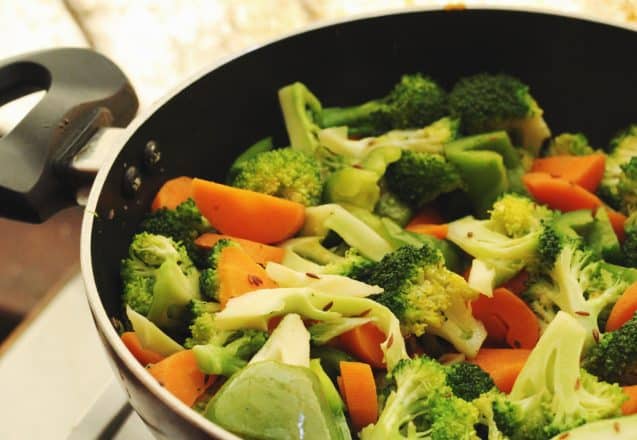
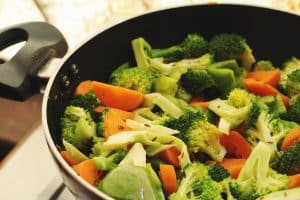 You probably have heard a lot about eating raw veggies and how healthy they are. While it's true some raw vegetables provide more nutrients than cooked ones do for some nutrients, cooking enhances other nutrient content. Cooking may destroy natural enzymes, but it's also easier to digest. Some vegetables simply don't taste good raw, either. It all depends on the vegetable and how you cook it.
You probably have heard a lot about eating raw veggies and how healthy they are. While it's true some raw vegetables provide more nutrients than cooked ones do for some nutrients, cooking enhances other nutrient content. Cooking may destroy natural enzymes, but it's also easier to digest. Some vegetables simply don't taste good raw, either. It all depends on the vegetable and how you cook it.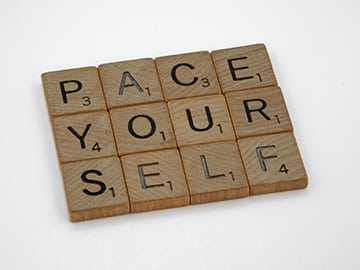
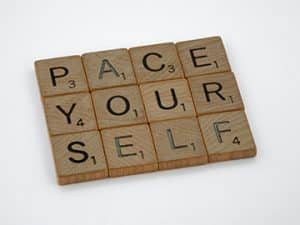 At Habitat Health and Fitness in Lakeland, Florida, FL, I get a lot of clients at that ask, "Should I push myself or pace myself?" There's no answer that fits all situations. If you're just starting a fitness program, pushing yourself too hard can actually cause a set-back. On the other hand, not pushing yourself won't always give you the results you want. Whether to push or pace depends on you, your knowledge and your goals.
At Habitat Health and Fitness in Lakeland, Florida, FL, I get a lot of clients at that ask, "Should I push myself or pace myself?" There's no answer that fits all situations. If you're just starting a fitness program, pushing yourself too hard can actually cause a set-back. On the other hand, not pushing yourself won't always give you the results you want. Whether to push or pace depends on you, your knowledge and your goals.